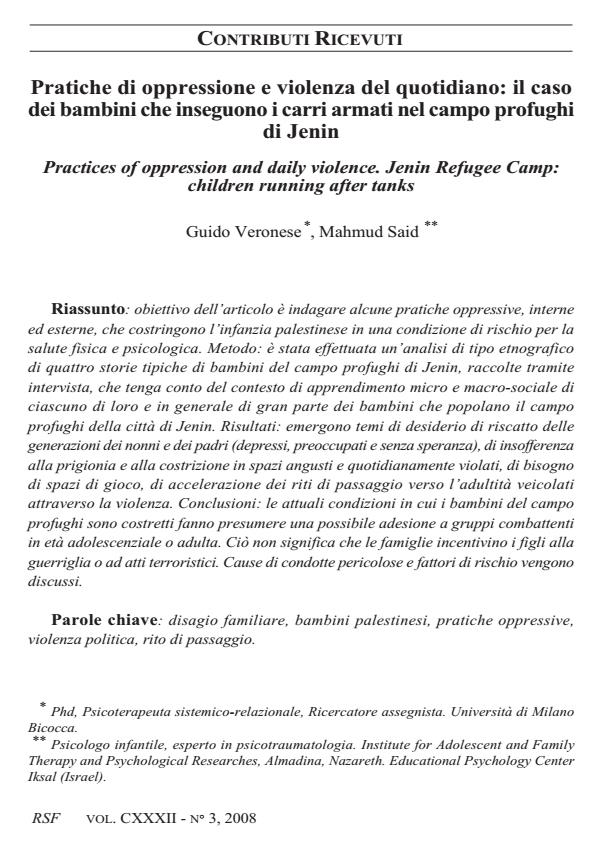Pratiche di oppressione e violenza del quotidiano: il caso dei bambini che inseguono i carri armati nel campo profughi di Jenin
Titolo Rivista RIVISTA SPERIMENTALE DI FRENIATRIA
Autori/Curatori Guido Veronese, Mahmud Said
Anno di pubblicazione 2008 Fascicolo 2008/3
Lingua Italiano Numero pagine 28 P. 87-114 Dimensione file 517 KB
DOI
Il DOI è il codice a barre della proprietà intellettuale: per saperne di più
clicca qui
Qui sotto puoi vedere in anteprima la prima pagina di questo articolo.
Se questo articolo ti interessa, lo puoi acquistare (e scaricare in formato pdf) seguendo le facili indicazioni per acquistare il download credit. Acquista Download Credits per scaricare questo Articolo in formato PDF

FrancoAngeli è membro della Publishers International Linking Association, Inc (PILA), associazione indipendente e non profit per facilitare (attraverso i servizi tecnologici implementati da CrossRef.org) l’accesso degli studiosi ai contenuti digitali nelle pubblicazioni professionali e scientifiche.
Pratiche di oppressione e violenza del quotidiano: il caso dei bambini che inseguono i carri armati nel campo profughi di Jenin - the authors study a number of internal and external oppressive practices that put Palestinian children’s health under physical and psychological risks. Method: four children living in the refugee camp of Jenin were interviewed and their emblematic stories were analysed using an ethnographic approach. The impact of the micro and macro elements of the living context on the developmental features of the four children were examined, context that most of the children in the camp live. Results: the themes appearing in the interviews highlight: the desire to redeem the grandparents’ and fathers’ past (generations today depressed, anxious and hopeless); the restiveness towards confinement to a constricted, daily violated, living space; the need of recreational areas for the children; the acceleration of the rites of passage towards adulthood, due to violence. Conclusions: the current conditions under which the children of the refugee camps are forced to live suggest their possible future affiliation, as adolescents or adults, to groups ready to fight. This does not mean that their families are encouraging them to join the guerrilla or to operate acts of terrorism. The causes of hazardous behaviours and risk factors are discussed. Keywords: family unease, Palestinian children, oppressive practices, political violence, rite of passage.
Guido Veronese, Mahmud Said, Pratiche di oppressione e violenza del quotidiano: il caso dei bambini che inseguono i carri armati nel campo profughi di Jenin in "RIVISTA SPERIMENTALE DI FRENIATRIA" 3/2008, pp 87-114, DOI: